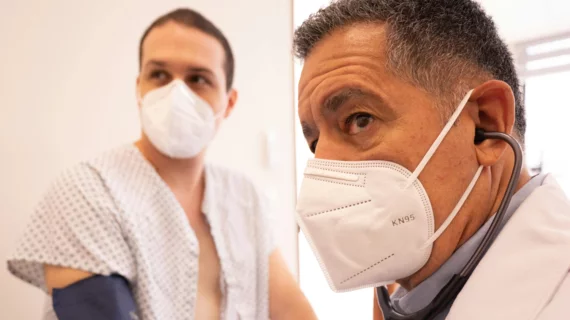Are these the 5 best healthcare AI products money can buy?
The count of medical devices that are both equipped with AI and approved by the FDA is approaching 1,000. No time like the present to canvass experts for their opinions on which tools are the best of the bunch (which numbered 882 as of mid-May).
Medscape had the notion and commissioned the legwork. The outlet started the informal competition with a simple qualification for entry: Finalists had to credibly claim to leverage AI for improving care while reducing costs.
Next, it whittled the field to “commercially available tools that were mentioned by more than one expert and/or have earned recognition from newly established organizations striving to standardize AI assessment processes,” such as the Coalition for Health AI and the Health AI Partnership.
From there independent reporter Sarah Amandolare asked a number of AI experts at AI-deploying hospitals to name the products making the biggest impact at their respective institutions.
Here are the top five as described in her resulting article, which Medscape published July 22.
1. LumineticsCore
LumineticsCore from Digital Diagnostics speeds diagnosis of diabetic retinopathy and macular edema right at the point of care, resulting in patients following through on care referrals at three times the rate of conventionally diagnosed patients, Medscape reports. More:
‘What makes the tool even more impactful, says Jennifer Goldsack, founder and CEO of the nonprofit Digital Medical Society, is that the company assumes full liability, so providers won’t be held liable if the diagnosis is wrong, and there’s a billing code enabling private insurance reimbursement.’
2. Abridge
This product, an ambient listening tool for clinical notes, originated at the University of Pittsburgh Medical Center. Designed to work with Epic as well as other electronic health record systems, Abridge is also in use at Emory Healthcare, Yale New Haven Health, Sutter Health, Christus Health and the University of Chicago, Medscape notes.
‘Unique to Abridge is the use of explainable AI: When you highlight parts of the AI-generated note, the tool reveals where in the source transcript the information came from, making it verifiable.’
3. Woebot
A conversational mental health app providing on-demand cognitive behavioral therapy, Woebot uses machine learning to understand patients’ messages before delivering pre-written responses created by clinicians.
‘So far, the app—a two-time MedTech Breakthrough award winner—is proving to be popular and convenient. More than 80% [of patients] like using it, a typical interaction lasts just seven minutes, and 77% of interactions occur when providers are off-duty.’
4. VBrain
Vysioneer’s VBrain speeds up brain-tumor contouring by about 30%, on average, and improves contouring accuracy by 12% compared with manual contouring, Medscape reports. Its FDA-approved deep learning algorithm detects the three most common types of brain tumors—metastasis, meningioma and acoustic neuroma. Amandolare quotes Nigam Shah, PhD, chief data scientist for Stanford Health Care:
‘It does 80% to 90% of the [contouring] job automatically. It doesn’t create a materially different outcome, but instead of a human painstakingly drawing something on the image for an hour, they can get it done in 15 minutes.’
5. GI Genius
This Medtronic offering is an AI-powered “backup camera” that helps identify colon lesions during colonoscopy. Its software creates a findings report immediately after endoscopy.
‘In a 2020 study, the tool increased the adenoma (pre-cancerous polyp) detection rate by more than 14%. In a separate study, it analyzed polyps 82% faster than the endoscopist.’
Shah of Stanford underscores that an FDA approval does not assure a product will deliver value by improving care while containing costs. He points to LumineticsCore as an example of a tool that has shown “a clear increase in the quality of care.”

